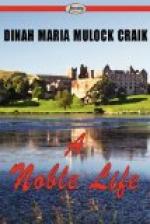“The earl, sir? Na, na”—with a mysterious shake of the head— “naebody sees the earl. Some say—but I hae nae cause to think it mysel’—that he’s no a’ there.”
The minister was sufficiently familiar with that queer, but very expressive Scotch phrase, “not all there,” to pursue no farther inquiries. But he sighed, and wished he had delayed a little before undertaking the tutorship. However, the matter was settled now, and Mr. Cardross was not the man ever to draw back from an agreement or shrink from a promise.
“Whatever the poor child is—even if an idiot,” thought he, “I will do my best for him, for his father’s and mother’s sake.”
And he paused several minutes before those bright and smiling portraits, pondering on the mysterious dealings of the great Ruler of the universe —how some are taken and some are left: those removed who seem most happy and most needed; those left behind whom it would have appeared, in our dim and short-sighted judgment, a mercy, both to themselves and others, quietly to have taken away.
But one thing the minister did in consequence of these somewhat sad and painful musings. On his return to the clachan—where, of course, the news of the earl’s coming home had long spread, and thrown the whole country-side into a state of the greatest excitement—he gave orders, or at least, advice—which was equivalent to orders, since everybody obeyed him—that there should be no special rejoicings on the earl’s coming home; no bonfire on the hill-side, or triumphal arches across the road, and at the ferry where the young earl would probably land— where, ten years before, the late Earl of Cairnforth had been not landed, but carried, stone-cold, with his dripping, and his dead hands still clutching the weeds of the loch. The minister vividly recalled the sight, and shuddered at it still.
“No, no,” said he, in talking the matter over with some of his people, whom he went among like a father among his children, true pastor of a most loving flock, “no; we’ll wait and see what the earl would like before we make any show. That we are glad to see him he knows well enough, or will very soon find out. And if he should arrive on such a night as this”—looking round on the magnificent June sunset, coloring the mountains at the head of the loch—“he will hardly need a brighter welcome to a bonnier home.”
But the earl did not arrive on a gorgeous evening like this, such as come sometimes to the shores of Loch Beg, and make it glow into a perfect paradise: he arrived in “saft” weather—in fact, on a pouring wet Saturday night, and all the clachan saw of him was the outside of his carriage, driving, with closed blinds, down the hill-side. He had taken a long round, and had not crossed the ferry; and he was carried as fast as possible through the dripping wood, reaching, just as darkness fell, the Castle door.




